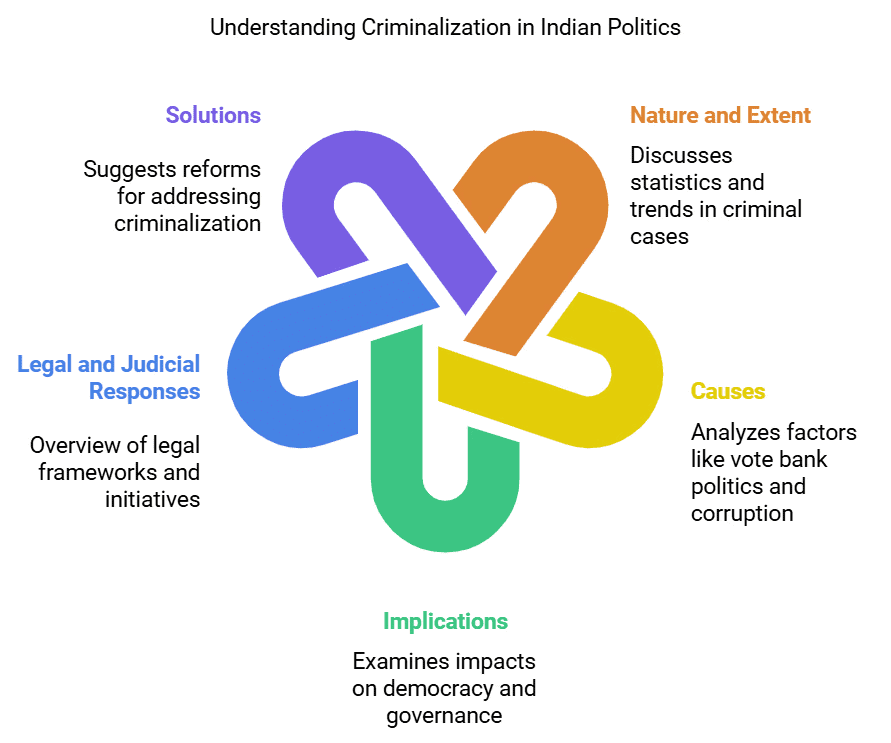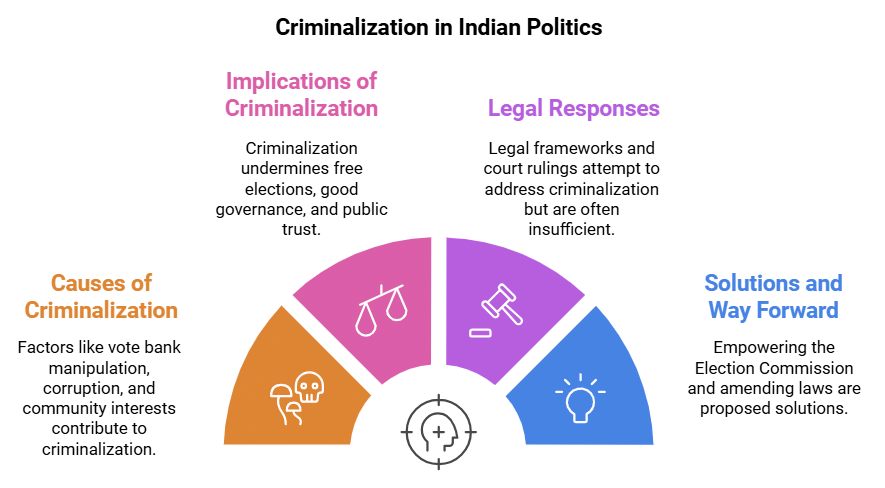Criminalization of Politics | UPSC Mains Essay Preparation PDF Download
To write an effective UPSC essay on "Criminalization of Politics," it is crucial to structure it with a clear introduction, body, and conclusion.
Here is a proposed structure for the essay, followed by the essay itself:
Introduction
- Start with a quote or phrase to set the tone.
- Briefly define criminalization of politics.
- Introduce the current scenario or a recent case study (e.g., the ADR report on Karnataka's 2023 Assembly Elections).
Body
- Section 1:The Nature and Extent of Criminalization in Indian Politics
- Discuss statistics and trends (e.g., ADR data, increase in criminal cases in Parliament).
- Section 2: Causes of Criminalization
- Analyze various factors contributing to this issue (Vote bank politics, corruption, vested interests, muscle and money power, poor governance).

- Analyze various factors contributing to this issue (Vote bank politics, corruption, vested interests, muscle and money power, poor governance).
- Section 3: Implications of Criminalization
- Discuss how it impacts democracy, governance, public service integrity, and social harmony.
- Section 4:Legal and Judicial Responses
- Overview of the legal framework (Representation of Peoples Act, Supreme Court Judgments).
- Discuss existing recommendations and initiatives against criminalization (Vohra Committee, Law Commission, Special Courts).
- Section 5:Solutions and Way Forward
- Suggest reforms (More power to ECI, voter awareness, expeditious judicial processes, amending RPA).
Conclusion
- Reinforce the urgency of addressing criminalization in politics.
- End with a forward-looking statement or quote that reflects a positive attitude towards change.
Sample Essay
The following essay serves as a sample for the given topic. Students can add their own ideas and points as well.
"Democracy must be built through open societies that share information. When there is information, there is enlightenment. When there is debate, there are solutions." - Atifete Jahjaga
The dark shadow of criminalization has been looming over the Indian political landscape, challenging the very essence of our democratic fabric. This phenomenon, where individuals with criminal backgrounds participate in governance, has increasingly become a critical concern. A recent report by the Association for Democratic Reforms (ADR) on the Karnataka 2023 Assembly Elections underscores this alarming trend, where the number of candidates with criminal cases has escalated across major political parties.
The Nature and Extent of Criminalization in Indian Politics
The ADR's statistics paint a grim picture: the proportion of parliamentarians with pending criminal cases has risen sharply from 24% in 2004 to 43% in 2019. A staggering 44% increase in MPs with declared criminal cases since 2009, including serious charges like rape and murder, signals a deep-rooted problem.
Causes of Criminalization
Several factors contribute to this malaise. The manipulation of vote banks through illegal means and the use of "goondas" for political gains reflect a disturbing confluence of crime and politics. Corruption plays a pivotal role, as electoral contests demand substantial financial resources, often sourced through unscrupulous means. The electorate's tendency to vote based on narrow community interests, overlooking candidates' criminal backgrounds, further exacerbates the issue. The muscle and money power used to instill fear and buy votes, coupled with poor governance and lax election laws, create a fertile ground for criminal elements to flourish in politics.
Implications of Criminalization
The consequences are far-reaching. The principle of free and fair elections, a cornerstone of democracy, is compromised. It hampers good governance, as law-breakers become law-makers, eroding the effectiveness of democratic processes. The proliferation of black money and corrupt practices undermines the integrity of public servants and erodes public trust in governance. Moreover, it breeds a culture of violence and sets a negative precedent for the youth, disrupting social harmony.
Legal and Judicial Responses
The legal framework, primarily the Representation of Peoples Act 1951, stipulates disqualification for certain offenses. However, it falls short of barring individuals with pending criminal cases. Supreme Court judgments have attempted to curb this trend. Landmark rulings like the Association for Democratic Reforms v. Union of India (2002) and Lily Thomas v. Union of India (2013) have mandated disclosure of criminal and financial records and disqualified convicted MPs/MLAs. Despite these measures, the effectiveness in curbing criminalization remains questionable.
Solutions and Way Forward
Empowering the Election Commission of India (ECI) with more authority can be a significant step in mitigating this issue. Voter education and vigilance against electoral malpractices are imperative. Fast-tracking judicial processes and establishing special courts can expedite the resolution of criminal cases against politicians. Furthermore, amending the Representation of Peoples Act to disqualify candidates with serious criminal charges, even if pending, can act as a strong deterrent.
Conclusion
The criminalization of politics is not just a political issue but a societal one that demands urgent and collective action. As former President APJ Abdul Kalam aptly said, "If a country is to be corruption free and become a nation of beautiful minds, I strongly feel there are three key societal members who can make a difference. They are the father, the mother, and the teacher." Thus, it is the responsibility of every citizen, from the family unit to the highest echelons of power, to strive towards purging our political system of criminal elements, thereby safeguarding the sanctity of our democracy and ensuring a brighter future for India.
|
4 videos|178 docs
|
FAQs on Criminalization of Politics - UPSC Mains Essay Preparation
| 1. What does the term "criminalization of politics" refer to? |  |
| 2. How does criminalization of politics impact democracy? |  |
| 3. What are some common factors contributing to the criminalization of politics? |  |
| 4. What measures can be taken to combat the criminalization of politics? |  |
| 5. What role does public awareness play in addressing the criminalization of politics? |  |






















